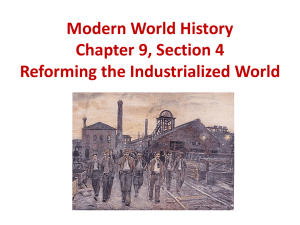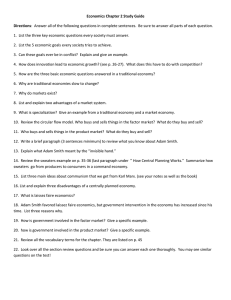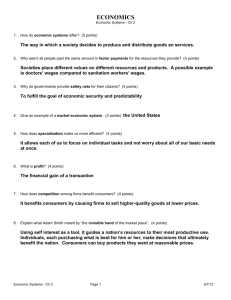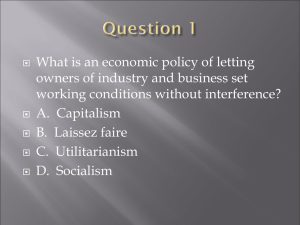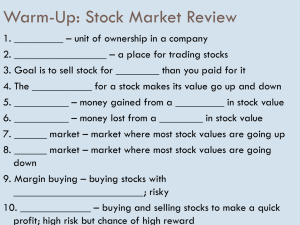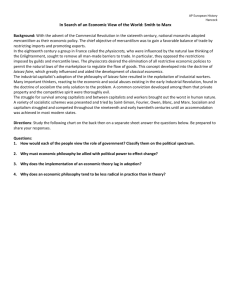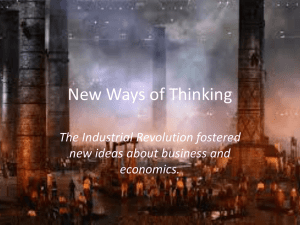Chapter 7 Section 4 New Ways of Thinking
advertisement
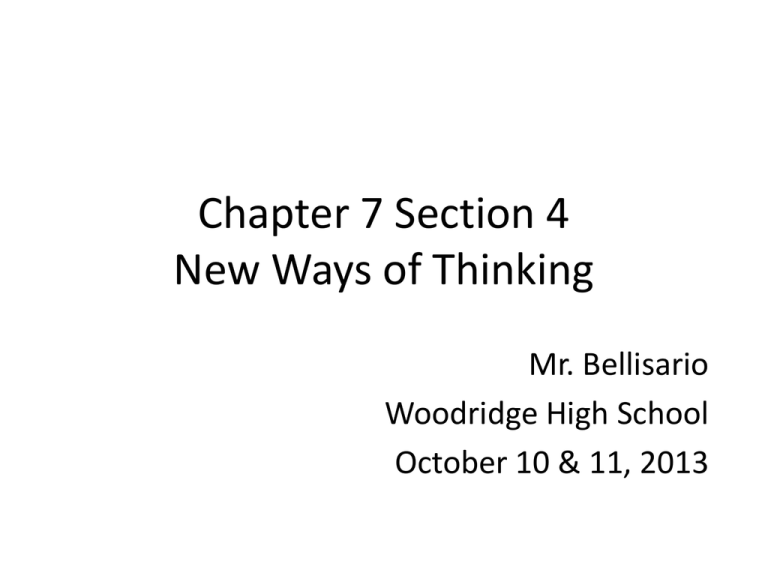
Chapter 7 Section 4 New Ways of Thinking Mr. Bellisario Woodridge High School October 10 & 11, 2013 Lesson Objectives • Describe laissez-faire economics and the beliefs of those who supported it. • Summarize the theories of socialism. • Explain Karl Marx views of the working class and the response to Marxism. Laissez Faire Economics Physiocrats • Believed government should not interfere in the free operation of economy • Early 1800’s middle class business leaders embraced “hands-off” Laissez Faire Economics Adam Smith • Wrote, Wealth of Nations (1776) • Believed in a free-market economy, no government intervention • Unregulated exchange of goods & services – would come to help everyone, not just the rich • Produce more goods at lower prices, making them affordable to everyone • Encourage capitalists to reinvest profits in new business Laissez Faire Economics Thomas Malthus • Population would grow more than food supply • Checks on population – War – Disease – Famine • Urged families to have fewer children Malthus’ Basic Theory Laissez Faire Economics David Ricardo • “iron law of wages” • When wages are high, families have more kids – This meant a greater labor force – Led to lower wages & higher unemployment Both Malthus & Ricardo felt… • Individuals should improve their lives through: – Thrift – Hard work – Limiting family size Utilitarians • Goals - of society should be the greatest happiness for greatest number – Jeremy Bentham & John Stuart Mills Utilitarians • Actions/laws are right if they bring happiness, wrong if they bring pain • Wanted government to help improve lives of working class • Factory workers – Had right to increase their own happiness – Government should step in when owners’ happiness hurt workers • Responsible for reforms from child labor to public health – But did not change society greatly – Goal was to end poverty & inequality Socialism • People, as a whole, would own means of production (factories, farms, natural resources, transportation, etc., needed to produce goods) • Condemned (hated) capitalism (individuals own means of production) Utopians • Early socialists – Built self-sufficient communities – Everything owned in common – All work shared Socialism Robert Owen • Selected New Lanark, Scotland as model village & factory, based on cooperation – – – – – Limited child labor Encouraged labor unions Homes for workers Schools for children Still able to make a profit Communism • Introduced by Karl Marx & Frederick Engels • Communism – radical form of socialism • A German socialist-philosopher & German socialist whose father owned textile factory in England – Communist Believe • A very few wealthy individuals controlled a majority of poor • Felt Utopians were unrealistic Karl Marx • Wrote Communist Manifesto (1848) • Saw class struggle between bourgeoisie (middle class) and proletariat (working class) as unavoidable • Marxism: – “Haves” (capitalists, bourgeoisie) always owned means of production & controlled society & wealth – “Have nots” (poor, working class, proletariat) would take control of means of production & set up a classless communist society by overthrowing the “haves”

